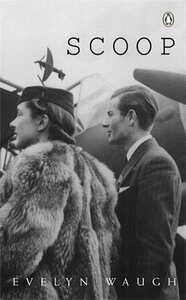Take a photo of a barcode or cover
You can find my full review of Scoop on Keeping Up With The Penguins.
It’s kind of funny, really, to read a book about journalists and newspapers written before the News Of The World scandal. Scoop reads like a time capsule of the by-gone “heyday” of newspaper journalism. The protagonist is the humble (read: poor) William Boot, who lives on the very-very outskirts of London and regularly contributes over-written nature columns to The Daily Beast, a newspaper owned by the terrifying and powerful Lord Copper. Boot’s life is turned upside-down when Lord Copper mistakes him for a fashionable member of the literati (John Courtney Boot, a distant cousin), and bullies him into accepting a post as a foreign correspondent.
I admire Waugh’s incredible foresight in his premise and plot, but it wasn’t mind-blowing reading. It really evoked The Thirty-Nine Steps for me, actually – a grumpy Pommy bloke, through a series of coincidences, gets thrust into a situation that’s beyond him and he has to rise to the challenge.
It’s kind of funny, really, to read a book about journalists and newspapers written before the News Of The World scandal. Scoop reads like a time capsule of the by-gone “heyday” of newspaper journalism. The protagonist is the humble (read: poor) William Boot, who lives on the very-very outskirts of London and regularly contributes over-written nature columns to The Daily Beast, a newspaper owned by the terrifying and powerful Lord Copper. Boot’s life is turned upside-down when Lord Copper mistakes him for a fashionable member of the literati (John Courtney Boot, a distant cousin), and bullies him into accepting a post as a foreign correspondent.
I admire Waugh’s incredible foresight in his premise and plot, but it wasn’t mind-blowing reading. It really evoked The Thirty-Nine Steps for me, actually – a grumpy Pommy bloke, through a series of coincidences, gets thrust into a situation that’s beyond him and he has to rise to the challenge.
Evelyn Waugh was one of those authors that I had somehow considered difficult for some reason. I mean, Brideshead Revisited and all that. But the description of this wicked little story sounded so tempting that I had to give it a try. I will definitely be reading more.
Scoop is the story about a modern war. Or rather, about modern journalism and how they report on a war. The war is in the fictional African country of Ismaelia, and our intrepid reporter is sent off to get the story. The Megalopolitan News Agency wants to be the first to break the story. Lady Stitch recommends her good friend, Mr. Boots. But a hapless editor hires the wrong Mr. Boots, and William is sent off quite unwillingly to cover a war he knows nothing about and which, in fact, hasn't really started yet. (But the paper still wants news of a victory around the first of July.)
Naive country gentleman William is soon mixing with a crowd of veteran news reporters, barnyard animals, a somewhat faithful German wife, a Scandinavian missionary, and a crowd of politicians as eager to avoid him as he is to speak to them. Only when events take a strange and sudden turn does William find his chance to get the story and get back home to England.
I have to add that this book is full of racial slurs. My impression is that they are mostly used to describe the close minded, bigoted attitude of the Europeans in the story, but it was still pretty shocking in parts. I really don't remember the last time I read anything quite this offensive, so take a warning from that.
My favorite quote from the story is when William is discussing the situation with his editor, Mr. Salter, just before leaving England.
"I don't read the papers very much. Can you tell me who is fighting who in Ishmaelia?"
"I think it's the Patriots and the Traitors."
"Yes, but which is which?"
"Oh, I don't know that. That's Policy, you see. It's nothing to do with me."
Very cynical, but very funny. Now I want to give that Brideshead Revisited book or whatever it is a try.
Scoop is the story about a modern war. Or rather, about modern journalism and how they report on a war. The war is in the fictional African country of Ismaelia, and our intrepid reporter is sent off to get the story. The Megalopolitan News Agency wants to be the first to break the story. Lady Stitch recommends her good friend, Mr. Boots. But a hapless editor hires the wrong Mr. Boots, and William is sent off quite unwillingly to cover a war he knows nothing about and which, in fact, hasn't really started yet. (But the paper still wants news of a victory around the first of July.)
Naive country gentleman William is soon mixing with a crowd of veteran news reporters, barnyard animals, a somewhat faithful German wife, a Scandinavian missionary, and a crowd of politicians as eager to avoid him as he is to speak to them. Only when events take a strange and sudden turn does William find his chance to get the story and get back home to England.
I have to add that this book is full of racial slurs. My impression is that they are mostly used to describe the close minded, bigoted attitude of the Europeans in the story, but it was still pretty shocking in parts. I really don't remember the last time I read anything quite this offensive, so take a warning from that.
My favorite quote from the story is when William is discussing the situation with his editor, Mr. Salter, just before leaving England.
"I don't read the papers very much. Can you tell me who is fighting who in Ishmaelia?"
"I think it's the Patriots and the Traitors."
"Yes, but which is which?"
"Oh, I don't know that. That's Policy, you see. It's nothing to do with me."
Very cynical, but very funny. Now I want to give that Brideshead Revisited book or whatever it is a try.
funny
medium-paced
A farcical, hilarious satire about journalism - which is still relevant today. The somewhat incompetent William Boot is mistakenly sent to be a foreign correspondent in an allegedly war-torn African state and stumbles across the myriad hilarities of sensationalist journalism and all of the trappings of international correspondence. Gloriously funny in a way that made Waugh one of literatures heavyweights. Lovelovelove.
slow-paced
Plot or Character Driven:
Character
Strong character development:
No
Loveable characters:
No
Diverse cast of characters:
No
Flaws of characters a main focus:
Yes
Graphic: Racial slurs, Racism
A novel I started and then looked forward to the chance to consume a few more chapters and be thrown into news journalism and far-away wars. Be warned, much of the book is set in Africa and was written in the 1930s: the language used can be a shock at times.
maybe 4.5? on account of the racism, and the ending petered out a bit. but, the racism is such that it seems to come from the characters (and is in character and of the time) rather than the author. not that i'd argue waugh wasn't racist, it just doesn't seem to be part of the novel's message, so is a pretty slight issue, i'd say.
this book is just so, so funny. i wish it were a movie, and also that an updated version were made into a movie, skewering the 24 hr newscycle.
this book is just so, so funny. i wish it were a movie, and also that an updated version were made into a movie, skewering the 24 hr newscycle.
lighthearted
medium-paced
Plot or Character Driven:
Plot
Strong character development:
No
Loveable characters:
No
Diverse cast of characters:
Yes
Flaws of characters a main focus:
No
War! What is it good for? Well newspapers it appears.
A witty, tongue in cheek look at the newspaper industry and what it will do for a scoop!
As always Waugh's use of language is dated (but it was written in 1933) but his wit and first class writing style shines through in this great read!
A witty, tongue in cheek look at the newspaper industry and what it will do for a scoop!
As always Waugh's use of language is dated (but it was written in 1933) but his wit and first class writing style shines through in this great read!






